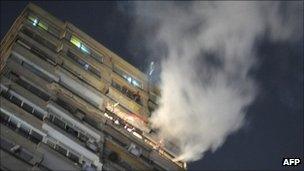Egyptian protesters break into Israeli embassy building
- Published
Protesters set fire to a police vehicle outside the building
Protesters have broken into the building housing Israel's embassy in Egypt's capital, Cairo, entering consular offices, officials said.
Security forces fired tear gas at the protesters who threw stones and petrol bombs at police vehicles. Israel's ambassador has flown out of Egypt.
US President Barack Obama urged Egypt to protect the embassy after Israel asked Washington for help.
Hundreds of protesters remain near the embassy, burning tyres in the street.
Live gun shots have been heard, as riot police try to disperse the demonstrators, says the BBC's Bethany Bell, in Cairo.
The air is still thick with tear gas, our correspondent says.
There have been protests outside the embassy for weeks amid a downturn in Egypt-Israel relations.
An Israeli official in Jerusalem said the attack was a "serious blow to the fabric of peace between Egypt and Israel".
The official said that at one point during the night, six Israeli embassy employees had been rescued from the mission by Egyptian commandos.
The unrest began after Friday prayers, when thousands converged on Cairo's Tahrir Square to demand faster political reforms following the ousting of former President Hosni Mubarak in February.
Later, hundreds marched on the Israeli embassy. They destroyed a wall around the building, before a group of about 30 broke in and threw documents out of windows.
Reuters news agency quoted an Israeli official in Jerusalem as saying that the documents appeared to be "pamphlets and forms kept at the foyer". Egypt's state media said some of the documents were marked confidential.
An Israeli official told the BBC the intruders had entered consular offices, but not the main embassy.
After initially standing by, police moved against the protesters, firing tear gas. Several vehicles were set alight.
Live TV pictures in the early hours of Saturday showed protesters throwing petrol bombs at police vans which drove at a crowd of people to try to scatter them.
Shots were heard in the area but it is not clear who fired them. There are reports a police station near the embassy was raided by protesters.
Egyptian state media said about 400 people had been injured in the unrest.
The BBC's Hamada Abu-Qamar in Cairo says the protesters want the embassy to be shut down.
A statement from the office of Israeli Defence Minister Ehud Barak said he had spoken with his US counterpart Leon Panetta and had "asked them to protect the embassy from the demonstrators".
President Obama appealed to Egypt to honour its international obligations and protect the mission, the White House said in a statement.
Israeli ambassador Yitzhak Levanon, his family and other embassy officials have been flown out of the country on board a military plane, Egyptian state TV reported.
However, Reuters says the Israeli consul is staying in Cairo to maintain the mission.
Egyptian Prime Minister Essam Sharaf had summoned his cabinet crisis team while the interior ministry put police forces on alert.
Peace treaty tested

An Israeli official said documents thrown by protesters appeared to be pamphlets from the foyer
There have been protests outside the embassy since the deaths on 18 August of five Egyptian policemen.
Egyptian officials say they were killed as Israeli forces chased suspected militants across the border.
Gunmen had earlier that day attacked Israeli civilian buses near the Red Sea resort of Eilat, killing eight people.
Hundreds of Egyptians protested outside the Israeli embassy in Cairo the following night, burning the Israeli flag and demanding the expulsion of the Israeli ambassador.
Cairo called the policemen's death "unacceptable". Israel did not admit responsibility, but said the deaths were regretted. Israel's defence minister said he had ordered a joint inquiry to be held with the Egyptian army.
Correspondents say the incident marked a sharp escalation in tensions between Israel and Egypt. Their 30-year-old peace treaty was already being tested after long-time Egyptian leader Hosni Mubarak was forced from office.
Under Mr Mubarak, ties between the two nations had been stable after a history of conflict.
But his removal has sparked fears among Israeli officials that a less amenable government could take charge in Cairo.
- Published10 September 2011
- Published20 August 2011
- Published20 August 2011